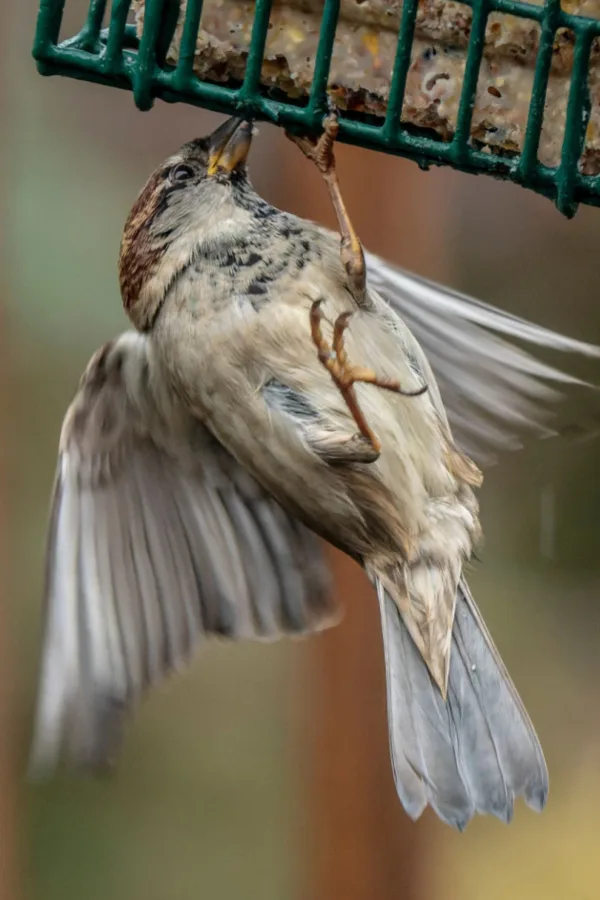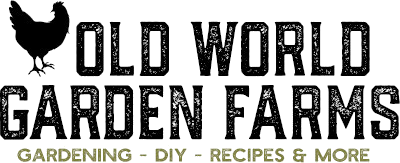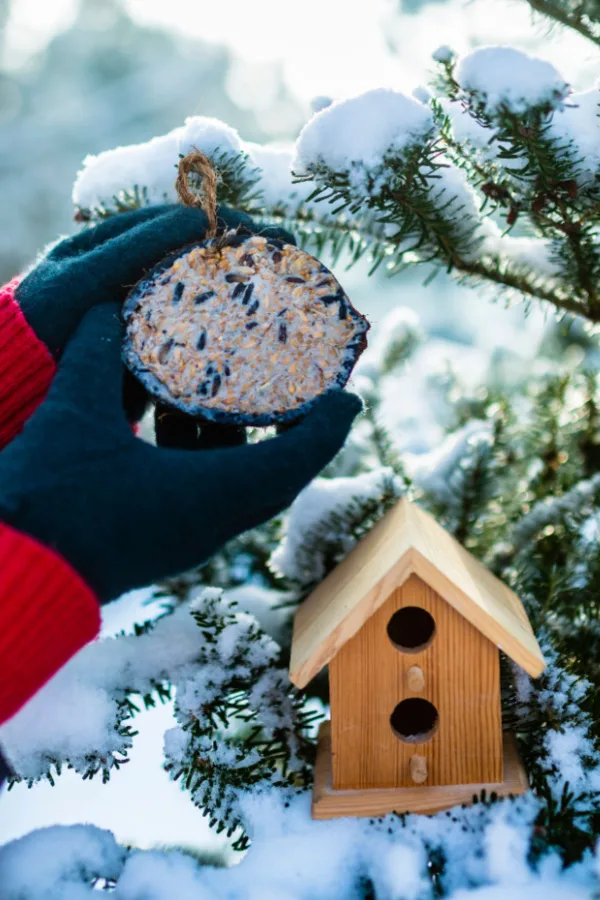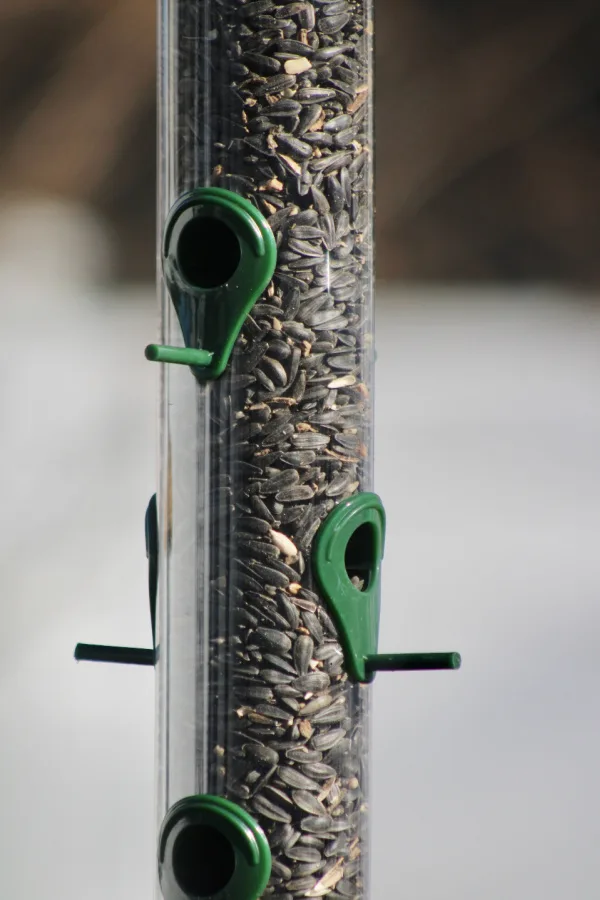One of the best ways to help birds survive the harsh conditions that winter can bring is to provide them with the seeds and feed they need to fuel their bodies.
Although many species of birds migrate to warmer locations in the winter, many choose to stick around and tough it out. And can it ever be tough on them! For birds such as chickadees, cardinals, bluejays, sparrows and many types of finches, winter’s cold and barren landscape can be brutal.
It’s hard enough that temperatures can drop dangerously low in the dead of winter. But even more, as the foliage drops from trees, bushes and shrubs, the cover of leaves that once provided protection and warmth for the birds is all but gone. And perhaps worst of all, so are most of their sources for food.

Birds rely heavily on insects, seeds, nuts and berries for food and fuel. In the summer, they are more than plentiful. Unfortunately, almost all of those sources become nonexistent once winter arrives. And when they do, it can become tough for birds to find the energy they need to stay warm and alive on frigid nights.
What Birds Need To Survive – The Best Seeds & Feed To Feed Birds In The Winter
In the summer, birds use energy to forage for their food, build nests and raise their young. But in the winter, they need energy more than anything else just to survive.
Birds burn up a tremendous amount of calories simply trying to stay warm. When the temperatures drop overnight, they burn energy to keep their tiny bodies from freezing. And a lot of it! That is exactly why in the early morning in winter, you will see birds out trying to recoup those calories by feeding.
Birds in the winter truly live day to day. Because of that – any food that can be provided for them can be crucial to their survival. But by providing them high-energy food sources, you can give them the super foods that can really make a difference.
With high energy, high fat and big calories in mind – here are some of the best feeds and seeds to give non-migrating birds the power they need to live through the winter!
The Best Seeds To Feed Birds In The Winter
Suet Blocks – The Best Seeds & Feed To Feed Birds In The Winter
Without a doubt, the most energy packed food source you can feed birds in the winter are suet blocks. What is a suet block? In its purest form, a suet block is rendered fat and bird seed that has been melted down and formed into blocks. And can it ever provide big nutrition for birds in the winter when they need it most!
The best part – suet is loved by a wide range of bird species. Chickadees, starlings, blue jays, cardinals, and nuthatches are all suet lovers. Even woodpeckers, orioles and robins enjoy them as well. Affiliate Link: St. Albans Bay Suet Plus Suet Cake Variety Packs
Suet blocks can be hung from trees, bushes or even off of posts or overhangs. They can be hung by themselves – but one of the best ways to provide them to your birds is with a suet feeder. Suet feeders hold the blocks of fat in place, allowing the birds a place to perch to eat with ease.

Less Is More…
When using suet blocks, only put out a small amount at a time. The blocks can go bad if the temperatures are warm enough, causing the birds to stop using them. Instead, give birds a small amount that they can quickly consume for a fast energy source.
You can purchase suet blocks in all shapes and sizes and with all types of added bird seed. You can also make your own quite easily – and it can actually be fun to do! For more on creating your own, be sure to check out our article How To Make Homemade Bird Suet on our sister site, Simple Garden Life.
Black Oil Sunflower Seeds – The Best Seeds & Feed To Feed Birds In The Winter
When it comes to bird seed – black oil sunflower seeds are the top choice for feeding birds in the winter. Not only do a wide range of birds love to consume them, they also happen to have an incredibly high fat and calorie content. And they are extremely nutritious too!
Black oil sunflower seeds contain high levels of protein, calcium, potassium, iron and fiber. Even better, their thin shell makes them easy for nearly every bird species to crack open!
Although striped sunflower seeds are still a great choice for winter feeding, always be sure to add a good dose of black oil sunflower seeds to the mix. They simply are the best choice of all for providing fast energy to a wide array of birds. Affiliate Link: Meadow Ridge Farms Black Oil Sunflower Bird Seed, 20-Pound Bag
Peanuts – The Best Seeds & Feed To Feed Birds In The Winter
In addition to sunflower seeds, feeding peanuts to birds is another one of the best ways to give them a high energy food source. It’s best to use a combination of shelled and whole peanuts in order feed a wide variety of overwintering birds.
Blue Jays, woodpeckers and cardinals all love whole peanuts. Nuthatches and chickadees on the other hand love them shelled. Mixing peanuts with sunflower seeds in a feeder will have birds visiting and revisiting your feeders every day!

Cracked Corn – The Best Seeds & Feed To Feed Birds In The Winter
If you are looking for a budget friendly way to feed birds with calories, cracked corn is a great go-to feed. Cracked corn is high in calories and carbohydrates and is easier on the bank account. It is great for mixing in with feed in your feeders, or simply scattering on the ground to allow birds quick and easy access.
It is important with corn to use cracked corn and not whole kernels. Although a few species of birds can consume whole corn, cracked corn is best. It is far easier to eat for a wider range of birds to feed from.
Last but not least, don’t forget to help your feathered friends out this winter with a source of water. When temperatures get extremely cold, most water sources freeze up. Simply providing a pail of water near feeders during the day will go a long way in giving them a quick drink.
Yes, it too will freeze, but by simply replacing it by your feeders during the morning hours when they need it most – it can give them that all important quick drink! If you really want to go the extra mile, you can even get electric ring heaters that can keep water sources from freezing all winter long.
With all of these great options for what to feed birds this winter, be sure you’re using the best feeders too! Take a look at our article: The 3 Best Types Of Bird Feeders To Use In The Winter – How To Feed Birds When It Gets Cold!
Here is to feeding birds this winter – and helping them survive! Happy Bird Watching – Jim and Mary.
Jim and Mary Competti have been writing gardening, DIY and recipe articles and books for over 15 years from their 46 acre Ohio farm. The two are frequent speakers on all things gardening and love to travel in their spare time.
As always, feel free to email us at thefarm@owgarden.com with comments, questions, or to simply say hello! You can sign up for our free email list in the subscribe now box in the middle of this article. Follow us on Facebook here : OWG Facebook. This article may contain affiliate links.


